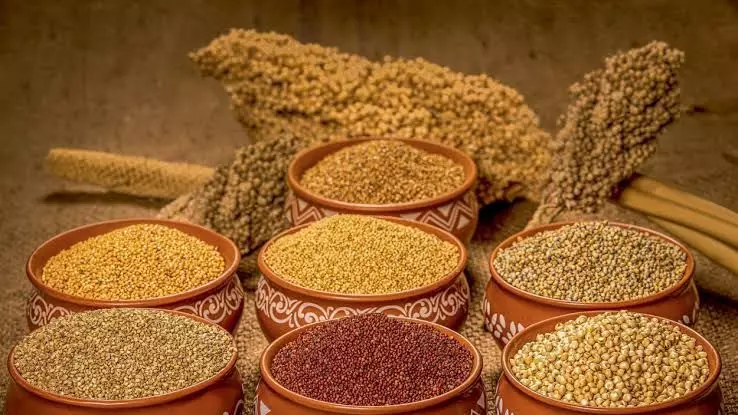Experts back millets as future food, advocate social media for authentic food facts
At the Hyderabad ICMR-NIN conference Nutrition experts endorsed millets as future food
By Sulogna Mehta
Hyderabad: While India has made extraordinary progress in agricultural and food production under different government missions between 1951 and 2023, a gap between food security and nutritional security continues to exist, said Dr Neelam Patel, senior advisor, Government of India, NITI Aayog.
Dr Neelam addressed the need to upgrade the nation’s food security policies during her keynote address at the 55th annual conference of the Nutrition Society of India (NSI). She was the Guest of Honour at the conference hosted by the Indian Council of Medical Research-National Institute of Nutrition (ICMR-NIN) in the city scheduled for November 25 and 26.
Efforts of farmers, scientists tripled food grain production
Addressing the experts who attended the event, Dr Patel said that there is a need for a holistic system-based approach to make the agricultural system sustainable.
“It is commendable that even though the area available for agriculture is more or less constant, production of food grain has tripled in the last five decades. The credit goes to the continuous efforts of scientists, research scholars, farmers and not just to government policies,” she said.
“Over the years, fluctuation in food production has decreased and we are moving towards climate resilience. We have also achieved food security and 67 per cent of the population is getting subsidised food grains. Around 79.84 crore people are covered under the National Food Safety Act (NFSA),” she said.
“However, there are challenges ahead. Apart from health, these include challenges from climate change, declining soil health, land degradation, depletion of groundwater, rising cost of cultivation, greenhouse gas emission, inadequate supply chain, increasing intensity in fertiliser application and falling crop response ratio. Therefore, there is a need to make our agriculture sustainable,” said the scientist.
Why millet production should be encouraged?
Emphasising the importance of nutritious food and millets, Dr Patel pointed out that it is a cause of concern that sugar consumption in the population has increased, consequently obesity and overweight issues have doubled within the last two decades.
“In our country, rice and wheat cultivation dominate while not much importance is given to millet production. However, millet cultivation is important for its health or nutritional benefits, to tackle climate change and strengthen climate resilience, to reduce fertiliser usage and to save water (as the crop is rain-fed and not irrigation-based). Government support and stakeholders’ expertise are also needed for diversification towards nutri-cereals like millets,” Dr Neelam said.
Diet and biomarker surveys across India
Later, Dr R Hemalatha, director of NIN and president of NSI spoke to the gathering. She informed the delegation of scientists that a phase-wise diet and biomarker survey is being carried out in states and Union Territories.
“This survey will provide authentic data on the level of anaemia and haemoglobin in the urban, rural and tribal populations across India. The survey will also evaluate the nutritional inadequacy and dietary patterns in the population. This is important because the rise in diet-related non-communicable diseases (NCDs) has almost taken an epic proportion especially due to consumption of unhealthy packaged food. In fact, 38 per cent of the people suffer from fatty liver disease due to their food habits,” said Dr Hemalatha.
The scientist also added that clinical trials related to millets are ongoing at NIN. “Millets are known to improve the level of micronutrients and haemoglobin status and their production is important amidst challenges like risk of contamination of the grains, shelf-life and need for advanced technology for its production. As much as 80 per cent of Asia’s millet is produced in India.”
With 2023 being declared the International Year of Millets, the conference is also providing stakeholders a platform to advocate the usage of millets as a cornerstone of health and nutrition.
Use social media to disseminate genuine nutritional messages
Speaking during the inaugural ceremony, Dr B Sesikeran, former director of NIN said that NSI should utilise social media at least weekly for disseminating evidence-based nutritional messages to the public, who are usually fed on fake and unscientific forwards through WhatsApp and other social media.
“Messages related to genuine nutrition and right dietary habits will have a cascading effect and the right information will go viral,” he said.
Apart from Dr Hemalatha, Dr Sesikeran and chief guest Dr Neelam Patel, Dr Avula Laxmaiah and Dr B Dinesh Kumar were also present at the inaugural of the conference. Following the inaugural, debates and deliberations on topics such as taxation of sugar-rich food, micronutrient deficiencies affecting cognitive functioning among school children, health benefits of millets etc. took place.